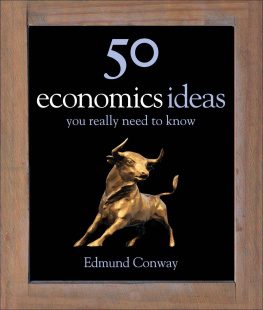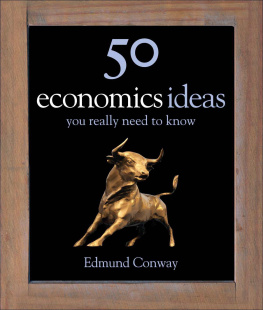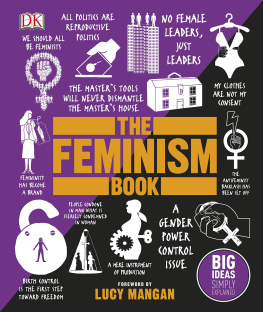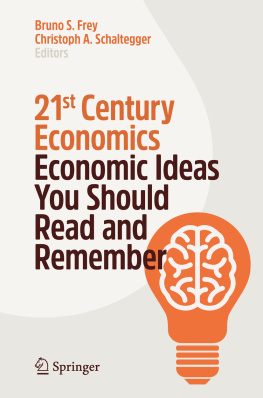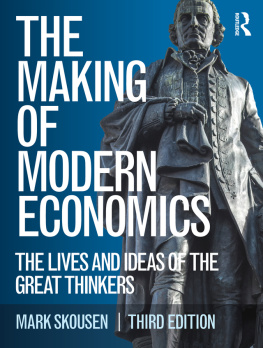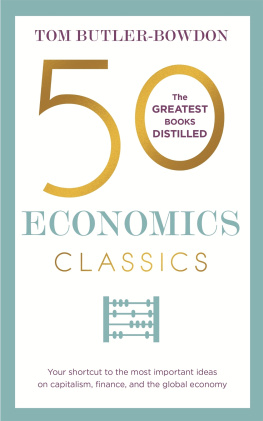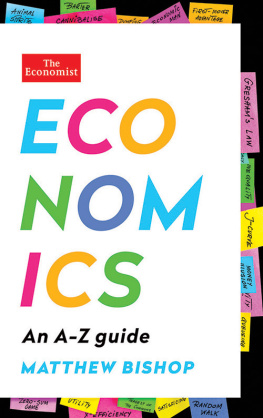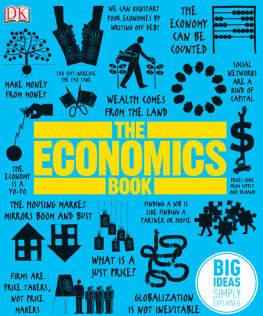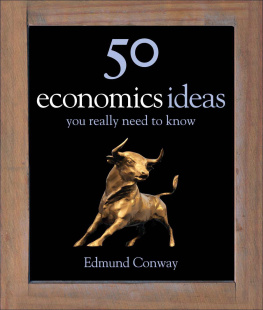economics ideas
you really need to know
Edmund Conway
First published in 2009
This ebook edition published in 2013 by
Quercus Editions Ltd
55 Baker Street
7th Floor, South Block
London
W1U 8EW
Copyright Edmund Conway 2009
Edmund Conway has asserted his right to be identified as author of this Work.
All rights reserved. No part of this publication may be reproduced, stored in a retrieval system, or transmitted in any form or by any means, electronic, mechanical, photocopying, recording, or otherwise, without the prior permission in writing of the copyright owner and publisher.
Quercus Publishing Plc hereby exclude all to the extent permitted by law for any errors or omissions in this book and for any loss, damage or expense (whether direct or indirect) suffered by a third party relying on any information contained in this book.
Every effort has been made to contact copyright holders. However, the publishers will be glad to rectify in future editions any inadvertent omissions brought to their attention.
A catalogue record of this book is available from the British Library
Ebook ISBN 978 1 84916 563 1
Print ISBN 978 1 84866 010 6
For further information and resources, visit www.edmundconway.com
Edited by Nick Fawcett and Ian Crofton
Designed by Patrick Nugent
Proofread by Ilsa Yardley
Indexed by Patricia Hymans
You can find this and many other great books at:
www.quercusbooks.co.uk
Contents
THE BASICS
THE MOVEMENTS
HOW ECONOMIES WORK
FINANCE AND MARKETS
THE ISSUES
ALTERNATIVE ECONOMICS
Introduction
A dreary, desolate and, indeed, quite abject and distressing [subject]; what we might call, by way of eminence, the dismal science.
Thomas Carlyles description of economics dates from 1849 but has stuck, for better or for worse. One should hardly be surprised. Economics is something people usually take notice of only when things go wrong. Only when an economy is facing a crisis, when thousands lose their jobs, when prices rise too high or fall too fast, do we tend to take much note of the subject. At such points there is little doubt it seems pretty dismal, especially when it underlines the challenges and the restraints we face, spells out the reality that we cant have everything we want and illustrates the fact that human beings are inherently imperfect.
The truth, I should add, in typical economist fashion, is far less simple. If it were merely a study of numbers, of statistics and of theories then the dismal science analogy would perhaps hold more ground. However, economics is, to its very heart, the study of people. It is an inquiry into how people succeed, into what makes us happy or content, into how humanity has managed over generations to become more healthy and prosperous than ever before.
Economics examines what drives human beings to do what they do, and looks at how they react when faced with difficulties or success. It investigates choices people make when given a limited set of options and how they trade them off against each other. It is a science that encompasses history, politics, psychology and, yes, the odd equation or two. If it is historys job to tell us what mistakes weve made over the past, it is up to economics to work out how to do things differently next time around.
Whether it succeeds in doing so is another question. As this book was going to press, the world was coming to terms with one of the biggest financial crises in history, as decades worth of debt overwhelmed international markets. Some of the worlds biggest and oldest banks, retailers and manufacturers collapsed. The crisis had many novel aspects new and complex financial instruments, for example, and new economic relationships as, for the first time since the end of the Cold War, the position of the United States as global superpower came under question. But it was in reality very similar to many crises in the past. If we can make the same mistakes over and over again, went the cry, what is the purpose of economics?
The answer is very simple. The wisdom we have gleaned over centuries on how best to run our economies has made us richer, healthier and longer-lived than our forefathers could ever have contemplated. This is by no means a given. One has only to look at countries in sub-Saharan Africa and parts of Asia where people are, in effect, stuck in the same conditions as Europe in the Middle Ages to realize our prosperity is by no means assured. It is, in fact, extremely fragile, but as is always the case with economics, we take this success for granted and tend instead to focus on the dismal side of things.
Such is human nature. Many economics books attempt to dispel such illusions. This is rather desperate and, frankly, not my style. The aim of this book is simply to explain how the economy works. The dirty little secret of economics is that its not really complicated at all why should it be? It is the study of humanity, and as such its ideas are often little more than common sense.
This book is not intended to be read as a continuous narrative: each of these 50 ideas should make sense on its own, though I have highlighted where you might benefit from looking at another chapter.
My hope is that by the time youve read most of the ideas you will be able to think that little bit more like an economist: to ask probing questions about why we act the way we do; to reject the conventional wisdom; to understand that even the simplest things in life are more complicated than they seem and all the more beautiful because of it.
A case in point is this Introduction. The done thing for an author is to include thanks to all who helped put the book together. But where to begin? Should I start by thanking the owners of the forest where the wood used to make the pages was felled? Or the factory workers who manufactured the ink that lines the pages? Or the operators of the machines in the bookbinding factory in China where the book was put together? Like so much else in this interconnected world, millions of people played a part in the creation of this book from the publishers and manufacturers of the book youre holding, to the shipping firms that sailed it from China to your bookstore, alongside many others. (To find out why the book was printed in China, read the chapter on globalization.)
In particular, this book is a product of the thousands of conversations I have had with economists, professors, financiers, businessmen and politicians in recent years; and of the excellent economics literature available on store bookshelves and, more excitingly, the Internet. Many of the ideas echo those by prominent and less prominent economists too numerous to mention. However, I should like also to thank Judith Shipman at Quercus for allowing me to be part of this excellent series; my copy editors, Nick Fawcett and Ian Crofton; Vicki and Mark Garthwaite for giving me a place to write it; David Litterick, Harry Briggs and Olivia Hunt for their input; and my mother and the rest of my family for their support.
Edmund Conway, 2009
The invisible hand
Greed is good, declared Gordon Gekko, villain of the classic 1980s movie Wall Street, in one fell swoop confirming polite societys worst fears about financiers. In this cut-throat Manhattan world, flagrant avarice was no longer anything to be ashamed of it should be worn with pride, like a striped shirt and red suspenders.

